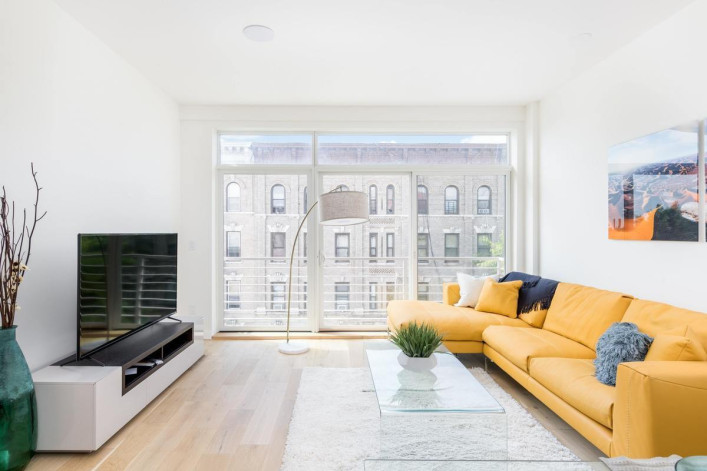8 most common questions for first-time buyers in NYC
If you’re a new buyer in New York City’s real estate market, you’re bound to have lots of questions, and the stakes are high: You want to make an informed decision and avoid expensive mistakes.
There’s a lot to ask about, and sometimes you don’t even know all the things you should be asking, so Brick Underground checked in with NYC brokers on what are the most common questions first-time buyers ask, and we got the answers, too.
Perhaps unsurprisingly, many of the queries focus on money: with questions on broker’s fees, closing costs, monthlies, and down payments being the most common. If your question is not covered here, consider BOND New York’s Adam Taylor’s biggest tip:
“The first thing to remember when buying real estate in New York is that there are no dumb questions. Because we live in such a real estate-driven city, where real estate often is the subject of cocktail chatter, many buyers are afraid to ask important questions because they feel like they should already know the answers.”
Read on for what real estate professionals say are the most common questions from first-time buyers—and how they respond to those questions.
1) What is the difference between a co-op and a condo?
Taylor says this is the number-one question from first-time buyers, and he responds by explaining that cooperatives have long been the traditional way to own an apartment and comprise approximately two thirds of all apartments in the city. But there are a few things to understand here.
When you buy an apartment in a co-op building, you are actually getting shares of a corporation, he explains.
“Typically the larger the apartment, the more shares of the corporation owned. Co-op shareholders pay a monthly maintenance fee to cover building expenses,” Taylor says.
You need to be approved by the board of directors, which also has the authority to determine how much of the purchase price may be financed and minimum cash requirements. “Purchasing a co-op can be an intricate process, and subletting the property can be challenging. In general, co-ops are not the right fit for investors but can be perfect for those wishing to make a home for several years,” he says.
A condominium is real property, and a purchaser is given a deed as if they were buying a house, Taylor explains. “Each individual apartment in a condominium receives a separate tax bill from the city.”
There is still a monthly common charge similar to the maintenance charges in a co-op, which is paid to the condominium association to cover such items as payroll, building maintenance and supplies, management fees, and building repairs.
“The straightforward nature of buying a condo, plus the fact that in some cases you can finance up to 90 percent of the purchase price and sublet your apartment at will, make this form of ownership a top choice for flexibility, especially among investors, foreign buyers, and parents purchasing for their children,” he says.
For more information, check out Brick Underground’s “Co-ops versus condo: Which is best for you?”
2) Do we have to pay a broker fee?
First-time buyers ask Angela Buglisi, luxury market manager at Mirador Real Estate, if they’re the ones who have to pay the commission. She explains that they’re off the hook here.
“Sellers pay the broker fee/commission in a standard sales transaction. Typically, the seller agrees to pay a 6 percent commission of the total sales price, which is divided equally between the seller’s broker and buyer’s broker," she says. "This is why, among other reasons, I encourage buyers to use a broker to ensure they have an advisor looking out for their interests."
Understanding the reasoning behind commissions is explained in Brick Underground’s “Is it worth paying a broker’s fee.”
3) Why do I need to have all this paperwork filled out before I start looking?
It’s important to meet with a mortgage broker before you go to your open house, and you need to have your mortgage preapproval and REBNY financial form filled out for two important reasons, Melissa Leifer, salesperson at Keller Williams, explains.
“Firstly, the market here moves so fast and is so competitive you have to be able to be ready to go. Secondly, your broker needs to understand your finances, because certain co-ops may be a better fit than others, and a seasoned broker will know which ones to show you and which ones not to, so that you don't get a board turndown and waste four months,” she says.
It’s important to show that you are fully qualified to purchase the home you want, Leifer says. Not having a preapproval letter can torpedo your search.
“Certain listings will also not even let you in for a showing unless you have a preapproval. No one will accept a financed offer without a preapproval letter, and submitting an offer without one shows the owner and listing broker that you are not a serious buyer, and that you may not qualify for the building,” she says.
For more on mortgages, check out Brick Underground’s “Everything the first-time apartment buyer needs to know to get approved for a mortgage.”
4) My lease is up in a few months. How do I time my purchase so I can move in at the end of my lease?
Many first-time home buyers ask Katie Thurber of the McPeak-Thurber Team at Halstead how they can line up a purchase or closing to coincide with their lease end date.
“Timelines are very important regarding a move, however the actual home you’re purchasing should be the top priority—the closing date is a secondary concern,” she says.
She says to plan on a three-month purchasing process. While that schedule can fluctuate, she says, “For a typical resale in NYC with a buyer that’s financing, I find this to be a sound amount of time to move through the motions, have the bank process the mortgage, and get through board approval. If you need to rent a short-term accommodation or close a bit earlier than your lease ending, that’s a small price to pay for your perfect new home.”
However, other agents say to use six months for a more conservative timeline. For more timeline details, check out Brick Underground’s “How long does it take to buy an apartment in New York City.”
5) Why is there a board interview?
Leifer explains that co-op apartments and some condos require all prospective purchasers or renters to interview with members of the board.
“A lot of people get really nervous about this, however I think it's a great thing. I live in a co-op myself and am the vice president of my co-op board," she says. "Interviews are one way a building can minimize the risk of getting someone who will not be able to meet the financial requirements, or will not respect the house rules. Vertical living in NYC really is a cooperative endeavor. Everyone is sharing the same hallways, laundry rooms, lobbies, and other building amenities. This is why I like living in a co-op. If I'm buying, I want to make sure that I have good neighbors.”
To get additional notes on what to expect, check out Brick Underground’s “So what’s a co-op board interview really like.”
Triplemint's Off-Market Advantage
Discover off-market properties in your dream neighborhood that perfectly suit your needs and budget. Meet and deal with sellers before their apartment hits the market.


Let Triplemint's off-market team give you exclusive access to apartments in your price range and desired neighborhood that no one else has seen. More options, less competition, no bidding wars.
6) What are closing costs?
Gabi Wuhl, an agent at CORE, gets asked about closings costs most frequently. She tells first-time buyers that closing costs are fees associated with purchasing and/or selling a home, which vary depending on building type, ownership, financing, and price point.
“The non-negotiable closing costs for the purchaser include things like attorney fees, transfer/flip tax, mansion tax if the purchase is $1 million and over, and miscellaneous processing fees. If financing, closing costs also include bank fees.
You can find out how to budget for closing costs in Brick Underground’s “Closing costs guide for buyers and sellers.”
7) Are monthlies (common charges, real estate taxes, and/or maintenance) negotiable?
No dice, says Wuhl. The monthly carrying costs for an apartment are non-negotiable because they are applied to the costs of running the building, with the rare exception of amenity fees that a buyer can choose to take advantage of or not, she says. These amenities might be the cost of storage or parking, for example.
For an explanation of what you pay in a co-op and what you pay in a condo, check out Brick Underground’s “What’s the difference between maintenance and common charges.”
8) My lender will give me $900,000. I have $100,000. Why can't I buy a home that costs $1,000,000?
CORE broker John Harrison hears this type of question frequently, and says there are a couple of issues at play here.
“The first problem is that buildings may be more restrictive than lenders. Even though a bank may provide 90 percent financing, it doesn't mean a building will. Many require at least 20-25 percent down," he says.
Looking to buy a co-op? Get information on rates and pre-qualification from National Cooperative Bank. NCB has been providing co-op unit loans in New York for over 40 years. Call us at (646)-201-4714 or email Brittney Baldwin at [email protected]. NMLS #507535. Equal Housing Lender.
The other problem is that you have not accounted for closing costs. “These can eat up a significant chunk of change and are needed in addition to the down payment,” he explains.
Lastly, after all down payments and closing costs are accounted for, you may need to meet post-closing liquidity requirements. These may also be much more stringent than the bank, he says.
There are other reasons you may get turned down for a loan. See them in Brick Underground’s “5 reasons the bank may turn you down for a mortgage.”
You Might Also Like





























